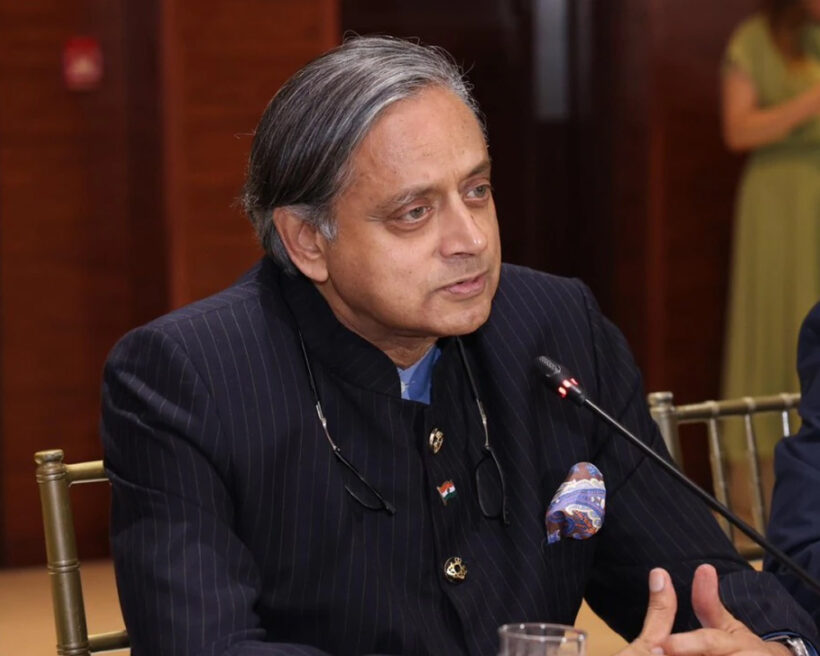🗣️ Tharoor’s Diplomatic Jibe: Using a Clinton Quote to Expose Pakistan’s Double Standards
Shashi Tharoor, a senior Congress leader and diplomat, made headlines during his recent U.S. visit when he cited Hillary Clinton’s now-famous warning: “You can’t keep snakes in your backyard and expect them only to bite your neighbors.” Tharoor used this metaphor to sharply criticize Pakistan’s long-standing policy of sheltering terrorist groups.
He addressed lawmakers and policy experts in Washington, D.C., as part of a multi-party Indian delegation, urging them to reconsider global tolerance toward Pakistan’s terror sponsorship. According to Tharoor, the international community must recognize that Islamabad’s policy of harboring terror groups has backfired, inflicting immense damage on its own people.
“Pakistan is reaping what it sowed. It is time the world stops treating it as a victim and starts holding it accountable,” Tharoor said.
🔥 Why Tharoor’s Words Matter in Global Politics
The power of Tharoor’s statement lies not just in the quote but in the timing and context. His visit occurred alongside that of Pakistani foreign minister Bilawal Bhutto Zardari, both lobbying American policymakers for support. While Bhutto projected Pakistan as a victim of terrorism, Tharoor countered with hard facts about Pakistan’s duplicity—acting as both arsonist and firefighter.
This pointed comparison was meant to draw attention to a critical geopolitical issue—cross-border terrorism, a persistent challenge that India faces due to Pakistan-sponsored militants.
“You can’t seek sympathy when you’re the one setting the fire,” Tharoor added.
🚨 Highlighting India’s Counterterrorism Resolve: Operation Sindoor
One of the core themes of Tharoor’s address was the Pahalgam terror attack that claimed the lives of over 26 Indian civilians. Following the attack, India launched Operation Sindoor, a strategic counter-terror offensive that targeted terror launchpads across the LoC.
Tharoor emphasized that this action was calibrated and intelligence-led, showcasing India’s capability to act firmly yet responsibly in the face of provocation. He clarified that India has no desire to escalate into full-scale conflict but will defend its sovereignty when pushed.
“The time had come to hit hard and smart. That’s what Operation Sindoor did,” he said.
🌍 Comparing Kashmir and Pakistan’s Tribal Belt
Tharoor also spoke about the transformation of Kashmir, which has witnessed a record boom in tourism and a decline in insurgency. Meanwhile, Pakistan’s own tribal regions remain volatile, especially areas affected by the Tehrik-i-Taliban Pakistan (TTP).
Key contrast highlighted:
-
Kashmir: Peace, tourism, development
-
Pakistan’s tribal regions: Lawlessness, extremist violence
Tharoor’s message: Pakistan must introspect before making claims of being a terror victim.
💧 Indus Waters Treaty & India’s Generosity
Addressing another sensitive issue, Tharoor mentioned the Indus Waters Treaty, which India has respected since 1960, despite enduring multiple provocations from Pakistan. He hinted that India’s strategic patience must not be mistaken for infinite tolerance.
“We’ve been generous. But that generosity must be met with reciprocity, not hostility,” Tharoor stated firmly.
This signals India’s willingness to revisit past policies if Pakistan continues to fuel anti-India sentiment.
💼 Message to the U.S. Congress: Choose Facts Over Narratives
A central objective of the Indian delegation’s U.S. visit was to counter the narrative Pakistan often pushes in the West—that it is a passive victim of terrorism. Tharoor and other delegates, including BJP and regional party MPs, showcased:
-
The human cost of terrorism in India
-
Documented proof of Pakistan’s terror networks
-
India’s democratic resilience and economic growth
He urged American lawmakers to recognize India’s global role and hold Pakistan accountable using facts, not sympathy-driven politics.
🧭 Kashmir as a Success Story
Tharoor emphasized that the world must see Kashmir as a symbol of Indian democracy’s success. Unlike Pakistan’s portrayal of the region as “occupied,” Indian Kashmir is thriving:
-
Over 2 crore tourists in 2023
-
Youth returning to school and employment
-
Decline in local recruitment by terror groups
This real-world transformation is India’s strongest answer to Pakistani propaganda.
🎯 Key Takeaways from Tharoor’s Strategic Address
1. Hillary Clinton’s quote was a deliberate tool to draw Western attention.
2. Pakistan’s terror policies are harming itself, not just neighbors.
3. India’s response has been responsible but resolute.
4. Kashmir is improving, while Pakistan’s border regions suffer.
5. Global powers like the U.S. must reevaluate whom they support diplomatically.
🔚 Final Thoughts: A Turning Point in South Asia Diplomacy
In a world where narratives often overshadow facts, Shashi Tharoor’s address in the U.S. was a bold reminder that truth still matters. By evoking Hillary Clinton’s iconic warning, he framed a complex geopolitical issue in clear moral terms.
“You can’t breed vipers and expect to remain unharmed,” he warned—a message not just for Pakistan, but for the global community.
As India continues to rise on the global stage, this marks a pivotal moment in reframing the Indo-Pakistani conflict for international audiences—not as a clash of equals, but as a confrontation between terror-fueled statecraft and democratic resilience.
For more updates, explore the Current News. Feel free to share your thoughts and comments.
If you’re passionate about building a successful blogging website, check out this helpful guide at Coding Tag – How to Start a Successful Blog. It offers practical steps and expert tips to kickstart your blogging journey!






